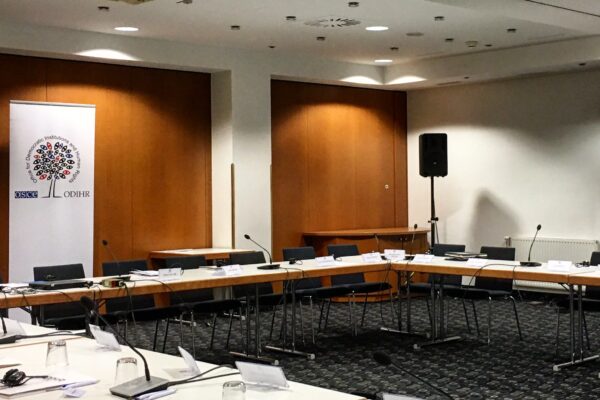The right to dissent is a founding principle of our country. Often, in the United States and abroad, powerful forces attempt to suppress speech in times of political tension or when people are making demands for change. Yet, this is exactly when speech and assembly are most important.
The right to peacefully assemble rests at the core of democratic societies and is guaranteed by a number of human rights laws and our own First Amendment. Despite clear protections, governments have not always protected the right to dissent, and it is a growing issue today. Fortunately, there a number of organizations worldwide working to safeguard this right.
“Everyone has the right to freedom of peaceful assembly and association.” Article 20, Universal Declaration of Human Rights (1948)
The Organization for Security and Co-operation in Europe (OSCE) has a dedicated Office for Democratic Institutions and Human Rights (ODIHR) which focuses on the freedom to peacefully assemble. Every two years, ODIHR travels to various countries to monitor assemblies and uphold the rights of demonstrators. ODIHR produces a monitoring report and invites practitioners who monitor assemblies to discuss obstacles to monitoring and areas in need of reform.
In December, I travelled to Vienna, Austria to participle in one of these roundtable discussions and share my experience monitoring assemblies with the
National Lawyers Guild and to discuss the ACLU of Ohio’s role during the 2016 Republican National Convention. The event brought together 34 civil society organizations and OSCE field offices from 18 different countries.
The role of assembly monitors—or as we call them, “legal observers”—is crucial to ensuring that people are able to express their views through speech and assembly. Legal observers serve as third-party monitors to document and witness any law enforcement misconduct, and they can also deter actions which would suppress speech and impede assemblies. Because of their role, legal observers help
ensure public accountability and effective dialogue on the policing of dissent . Well-documented monitoring reports can even be used to highlight best practices as well as advocate for policy changes with authorities.
Check out ODIHR’s Handbook on Monitoring the Freedom of Peaceful Assembly
While the current political and governmental structures and climates may be different in countries ranging from Turkey to the UK, we face many of the same obstacles to the freedom of assembly. Participants discussed
excessive use of force and the militarization of law enforcement , as well as increased surveillance technology used on demonstrators and monitors alike. A theme was clear: while authorities have an obligation to help protect and facilitate assemblies, in practice, they often do the opposite. We know that over the past several years, law enforcement across the United States has engaged in
sweeping civil liberties violations, engaging in the mass arrest and surveillance of protesters related to the Black Lives Matter and other movements.
Many participants also expressed concerns around the need for law enforcement to ensure the right of everyone to assemble and to protect various groups from counter demonstrators, especially during times of political friction. Likewise, many countries are struggling with the intersection of assembly and the right to privacy. For example, simply attending an LGBT Pride event could put your life at risk, yet in some countries it is illegal to wear a mask to protect your identity.
The roundtable highlighted the need for
monitors to continue to observe assemblies and help uphold the right to dissent. Everyone should be able to associate freely, organize, and make themselves heard through assembly to push for political and social change without fear of cumbersome hurdles or looming punishment.
Thankfully the ACLU has been championing First Amendment rights for nearly 100 years, and we will continue to do so for many more.
The day after President-elect Trumps’ inauguration, hundreds of thousands of demonstrators are set to participate in the Women’s March on Washington, and the ACLU is a proud sponsor.


